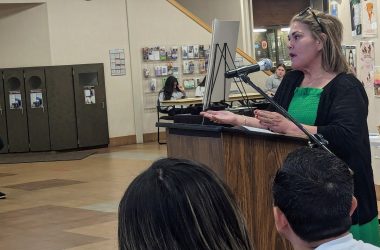A state tax credit to support local news in Oregon drew a lot of comments from readers.
Many are concerned about the diminishing amount of local news in communities across Oregon.
Others worry about government funding for independent news.
The comments responded to a recent Editor’s Note in Salem Reporter describing the demise of a major daily newspaper in Oregon and other cuts to local news resources.
The column also cited a proposal from legislators to create a state tax credit, which would be established through House Bill 2605. The legislation has been assigned to the House Rules Committee.
Readers were invited to offer their thoughts – and they are still rolling in. Here is what people around Salem are saying. Want to add your voice? Send an email to Editor Les Zaitz – [email protected].
Bonnie Davidson:
Every time a newspaper literally and figuratively silences the presses, a shiver of fear and regret runs down my spine. I truly believe that without a free press—big, small, national, local—democracy loses a bit of its power. We support independent journalism and believe that investigative journalism in particular is as necessary as the air we breathe. Along with the Salem Reporter, we also support public television and radio; as a retired couple we would certainly stretch our retirement funds to add to those if a tax credit becomes available.
Marcia Hoak:
It’s frightening, indeed! And getting more so.
I think HB2605 is a step in the right direction Let’s start a serious conversation at the legislative level, with this idea explored, and hopefully other ones surfacing, and bringing the issue to the attention of more people. It won’t solve the problem, but hopefully will start a process, and soon, before more shut down. “Democracy dies in the darkness” indeed!
Merrily McCabe:
I definitely agree with you that it is a major loss for all of us to lose quality local news reporting. As you point out, our citizens are less informed about what local government is doing, and our sense of community is diminished when we don’t know what’s going on in our local schools or neighboring communities. It’s so easy for people to rely on Facebook and other social media as though whatever people say in those venues is accurate information when there is no local news source with the role of responsibly reporting news.
I’m very sad at the loss of local news in the Statesman Journal in Salem. You know that we get a lot of USA Today national news in the local rag, but not very much true local news – what’s going on with our parks, our city government, our school district, our community organizations.
Very distressing for someone like me who has grown up with a local daily paper to rely on almost everywhere I’ve lived. Plus 40 some years in Salem alone, with both the Statesman Journal and the Oregonian to rely on for local news through most of those years.
Do definitely think having some of the state budget allotted to support local print news is a good idea in my book! Keep up the good work!
Cathy Daniels:
I agree that something needs to be done to try to reverse the trend of losing local news outlets. Soon it will be too late.
Larry Glassock:
My father was a journalism major at Oregon State until the depression interfered, however he pounded into me the power of the written word. I just wish I had paid more attention.
Later in my life I had a father-in-law, James Fowler, who for several years in the mid 1940s was a reporter for AP. He was the reporter on site when President Roosevelt died and dictated the story by telephone to the AP New York headquarters. He also had the opportunity to interview a number of political, sports and entertainment stars. I truly enjoyed our many discussions about the bastardization of the media, particularly newspapers.
I understand that it takes revenue to support the costs producing a news entity. However, I strongly reject the concept of government financial support for the newspaper industry. You know as well as I do that once the camel’s nose is under the tent the whole body will follow.
Once the government lends its support, they will begin to dictate what you publish. The government will own you. The “free press” is under attack, and it is newsmen like you who must vigorously advocate for the ability to report the unbiased who, what, when, why and how much of every story.
Bill Foster:
Historically, newspapers were profitable for owners and they tended to pursue their own interests with content, not necessarily the public interest. In those pursuits, accurate reporting sometimes was collateral damage.
However, a good, non-biased an accurate source of news is critical to our society. Going back to the days of Walter Cronkite and his ilk, the media was trusted. Over the intervening decades, in addition to a multitude of sources, and a whole different arena for advertising, trust has continued to devolve.
To my knowledge, the print media has never had the governmental oversight that radio and television has had. The government has intervened in the marketplace on many fronts with subsidies. On the surface, subsidizing mega agribusiness does not seem necessary, but those subsidies continue. Other areas, like support for a national passenger rail network, the arts, public broadcasting and others continue to be challenged by political interests that run contrary to the public interest.
In order to keep a healthier media alive, I would fully support some government subsidies. However, it would need to come with some assurances that reporting would be balanced and the focus on public purpose was preserved.
Jan Walker:
I have had issues lately with the Statesman Journal. In my own opinion, the main issue is customer assistance. Be more of a service industry than any other kind of business. There are no Saturday Statesman Journal’s and no holiday issues.
It’s like the difference between a bank and a credit union. Credit unions care about their members and banks only think about the almighty $$$$ including the stock market.
IF newspapers cared more about their customers and actually printed mainly the news in their area then there might be more customers. I have several friends that don’t have computers or even a cell phone. Think about being more inclusive.
Alma Whalen:
I’m a Salem resident, but I’m growing more and more concerned about newspaper shutdowns around the state. I would support a tax credit, but I understand it’s not that simple. As you allude to in your column, receiving funding from the people you report on could be tricky.
Know that I’m speaking from a place of ignorance about how newspapers run their operations, but sometimes I wonder if there’s a way for newspapers to partner with each other and have some sort of shared subscription. I rely on the Salem Reporter and the Statesman for most of my daily news consumption, but often look at goings-on around the state.
The problem there is that I don’t want to pay for a whole new subscription. However, I’d jump on an opportunity to pay more for my Salem Reporter subscription if I could also read articles published in other papers.
That said, I’d also jump on an opportunity to pay more for my newspaper subscriptions on a monthly basis without any expectation for more coverage. Knowing that some folks can’t afford to pay more, maybe those of us who can could opt-in to a higher subscription rate.
Your work is so important for our community. I am immensely sad for the folks who are losing their local papers.
Dago Benavidez:
You folks are the ground runners that keep us informed of what is really going on. Just let me know and I will walk with other folks that feel the same way. We need community-based papers like this to keep us informed, statewide and national are good but we need to feel the pulse of the community!
Larry Ulmer:
I just read your article about the demise of local papers in Medford, Stayton and Silverton.
It’s alarming. I subscribed to my city’s newspaper to read and support local news. Though I found many stories interesting, I also found many stories tainted by “editorialized reporting”. They are owned by a national chain. I canceled my subscription.
The heavy hand of the federal government appears to be meddling with social media platforms and news agencies have become echo chambers for political idealogues. Even the proud New York Times seems to have an aversion to printing facts. I feel badly for non-biased reporters in a world of completely biased media.
How did we get here? I remember TV shows featuring reporters and editors risking it all to get the truth out. Journalists were respected. Maybe that was fantasy. Perhaps we need a Pinocchio scale to rate papers on their factual content and retraction count.
I would love to see local papers thrive again. Seeing the state getting involved in the funding of those papers scares me. Especially with a state government so tilted in one direction.
Thanks for your commitment to keeping it real. I know you can’t make everyone happy. Sometimes we have to deal with the truth.
Linda Gilbert:
Please help the Legislature understand how important reliable local news is to us, the citizens, and to them.
Susan Taylor:
Now more than ever truth matters!! Local newspapers must survive and deserve public and government support. I strongly support any and all financial support required!!
Art Fox:
I’m all in on representative State Rep. Khanh Pham, bill. Totally agree with what you wrote and “all” of us need to wake up and see what is happening to our local news sources. If the bill survives, maybe, and just maybe, people will take the papers available locally and start reading them….or am I asking too much? Easier to get your point of view news on social media. Don’t get me going.
Nancy Daniel:
I am gratified by the suggestion that individual and/or public financial support of local news sources could become a tax-deductible expense. Not that people of limited means would need this tax benefit but those who could benefit from the tax benefit can and should support such a legal provision.
I am one of those who could and would be more generous than I have already been supporting journalism. Whoever thought that the “free enterprise” system would or could ever be motivated by results that are primarily for “the public good” (as opposed to the profit for any individual or entity) does not understand human psychology. There has to be some mutually beneficial collaboration between private and public institutions/organizations that supports the Fourth Estate.
Jeff Sturm:
The need for local press. A while back, I read in the Nation, about a corporation, whose name I don’t (unfortunately) recall buying up local papers, gutting the staff, then selling off the equipment. I don’t think that it is Sinclair, I think they are just broadcasting, but I’m not sure.
Since most of the “election denier” success was at the local level in November, we need to have an independent, objective local source of hard news that asks the tough questions. With Fox, we already have the closest thing to an “official” news agency, like Tass was, at a national level. We certainly can’t afford this locally, especially when the likes of Steve Bannon are aiming at a takeover of local school boards, election organizations and poll workers.
Betsy Scott:
OH YES! I most heartily support the concept of tax credit, outright funding, or whatever else might be available in favor of local journalism continuing.
My husband speaks wistfully of the halcyon days in Salem when there was a local morning AND afternoon paper, in addition to The Oregonian.
Editorials? Letters to the editor? Op eds? I think the Washington Post has it just about right: Democracy Dies in Darkness. How much darker does it get when responsible journalists are out of work, when responsible publications are shuttered.
My one great concern is feasibility. I know that people who treasure reasoned and balanced assessment of current events will support this concept. What worries me is that fits that will be pitched over “taxpayer money being used to support biased leftist rags” and you know that’s exactly where they’ll go first.
Sigh.
But that sure does not mean we must not try.
Deb Thomas:
Sounds like a terrible idea in today’s landscape of government censorship on social media.
Pat Mallette:
I read your article and it seems like a good idea. However, I have two concerns.
One: unfortunately, when organizations give money they often expect things in return. If tax credits were given to local newspapers, it’s entirely possible the government would come to expect preferential treatment when articles about them are written. After all, we know that often newspapers are loathe to criticize a business that spends lots of money for ads.
Secondly, I can’t get behind giving money to think tanks. Just give the money to struggling or new local news media.
Kathleen Dalton:
I am an adamant supporter of local journalism. In my view, it is the only thing that can keep government (at all levels, from school boards on up) in check, regardless of which side of the aisle readers are on. I genuinely believe that losing local journalism is one of the most serious threats to our democracy.
I would support state tax credits for those who support it. However, that doesn’t sound like enough to me. I wish I knew how to contact Bill/Melynda Gates and their billionaire pals who have promised to give away most of their fortunes to worthy causes. I can’t think of anything more important than this cause. I would love to talk with Phil and Penny Knight and ask them to consider throwing their financial support to Oregon journalism, but I have no clue how to reach them. After all, they are UO’s biggest sports supporters.
Why not put their heads together to figure out a way their money could reinstate these now defunct newspapers? And I’m not saying they need to support daily news PAPERs. Paper news seems to have little relevance to today’s culture. But online news is relevant and is where the money should be spent.
Bill Galbraith:
As a subscriber to both Salem Reporter and the Statesman Journal, as well as OPB, I am very much in favor of keeping local news coverage alive and thriving. However, I am concerned about taking public money to help pay for that news. It is all too common for those dependent on politically-driven money to find themselves having to pay service to those political entities.
In other words, the watchdog may become a lapdog if it finds itself dependent on funds from whatever political party or movement is in control of their funding at the moment. Obviously, this would compromise the independence of the press- the very thing that we would like to ensure. Careful readers of history will note that this has happened before. Often.
The obvious answer is for more ordinary Oregonians to step up and pay for their local news, but sadly, we see that support dwindling everywhere in America now, including in Oregon. I really don’t know what the ultimate answer is, but I’m willing to keep supporting our local news outlets, even when I disagree with them. That’s what a free, fair and independent press is all about.
Doug Luth:
Really concerned about the loss of any objective news sources! Given the governments (at all levels, including political parties) best intentions of a “hands off” policy; I’m a skeptic.
I have no good suggestions on how to help our local news sources survive other than advertisements/subscriptions. Maybe a statewide or local dedicated sales tax with a builtin distribution formula which cannot be easily tampered with.
Cynthia Donald:
I’ve enjoyed reading the Reporter daily since you started the newspaper and hope it continues. I believe funding is essential from both the public and government otherwise we will go the way of Fox Non-News. There’s always the BBC, Washington Post and New York Times for global perspectives, but they won’t cover more local issues that affect OR, WA, IA and CA.
Thank you and all your amazing staff for the outstanding job you are doing. I hope you hear from lots of happy readers!
Geoff Tiffany:
First, tax credits drain resources from other programs that the Legislature has already budgeted for. I would like to see a corporation like OPB, but it could be the Oregon Local News Trust or something like that.
It would be clear that these local organizations would need to get underwriters and sponsors, but it would also have direct financial support from Oregon taxpayers.
The problem with Oregon politics is that it most likely could not pass a bill to create a SAIF-like coloration to support local media, but that is needed.
The ask would not be too hard because the Republicans are so far in the minority they could not block this type of legislation.
Here is the question: Why go small? Tax credits…. It lacks luster and does not get to the real source of the problem: funding and independence.
Let’s go big; I think we should create a nonprofit for independent journalism, fund part of it from taxes and ask the local communities to fund the other half of it.
Mary Ritter:
Mass market local news is dying on the vine. Holdouts are older folks who love the paper with their morning coffee. It is the best way to read, but print news is not new or local, so anyone under 65 is turning to online formats.
That is why I subscribed to you and NextDoor and cancelled the Oregonian and the Statesman Journal. I could not get real local news because Gannett owns everything. I don’t like the format and I don’t get my daily crossword, comics, or Suduko anymore, but it is what is available and local.
Charlie Vizina:
Stateman Journal has gotten down to no news (local) and is very liberal leaning.
Jeanne Arana:
My thoughts on a tax credit for Oregonians who subscribe to a newspaper: This proposal has many facets, and I disagree with most, or even all of them.
Tax credits work to incentivize people to behave in a way the government deems acceptable while the remainder of citizens pay the difference. I find this role to be outside the scope of government, particularly when market forces should be at work. We can see how effective government has been in dealing with the “affordable housing” issue. A vicious cycle of regulating problems into existence then efforts to incentivize their way out of the problems, all while increasing costs and limiting supply.
Who in government will be responsible for rule-making to determine what constitutes a tax credit-worthy newspaper? And I suspect the rules would tip in a decidedly political way. You print something a certain politician dislikes and your paper no longer qualifies, for example.
Finally, my most vehement objection deals with the role of government as outlined in the First Amendment. Government is restricted from making laws that abridge the freedom of the press. My understanding is government and the press are separate entities and should keep that separation to allow the press to serve as a watchdog of government…unfettered. The Fourth Estate, if you will. I have never known a government program that, while it may have begun with the best of intentions, didn’t ultimately hit the slippery slope of an overreaching government. The government is paying for it, therefore it can attach strings. I don’t profess to have read every outcome of every government program, but am willing to bet most, if not all, have gone the way of expansion rather than contraction.
So, that’s all that came to the top of my head. I’m sure there are many more reasons to throw this bill out. In the meantime, I will continue to subscribe to Salem Reporter, Statesman Journal, and probably add Malheur Enterprise one of these days. I hope the industry looks for a different path to survive.
Pam Ferrara:
As much as I love them, what a political football that would become!
Julie Hamre:
Yup, great idea
Karen Kohne:
Government intervention into private enterprise spells control, regulation and even censorship. He who pays can have a say.
While I am very distressed over the demise of hometown newspapers, having the government involved is one more step toward socialism.
Annalivia Palazzo-Angulo:
The obvious question is whether or not people perceive that the news is biased because of government funding.
However, my favorite news is NPR and OPB which is both funded by government and individuals as nonprofits. I personally feel that they are the most unbiased news available, but others disagree.
I do wonder if being a nonprofit is the answer.
Ron Steiner:
I joined a media company in 1966, when I became a salesperson of television advertising with the Cox Broadcasting Company in Pittsburgh. I had floated through five years from graduating college through four jobs and in one year of graduate school. When I joined WIIC-TV, the NBC affiliate there, I found a home.
Just before I joined that company it had been owned by the same company that owned the Pittsburgh Post-Gazette, a morning newspaper in the City of Champions. Not only did they had great sports teams, the Steelers, the Pirates and Pitt in that era, and they also had one of the largest number of corporate headquarters among the top 500 in the country. It was a different time then.
After 13 years at the station, I worked my way up through the sales ranks and then out to a general manager’s job of a TV station in Toledo, Ohio, then on to Albuquerque, New Mexico, and then into a consulting business serving companies that are on TV stations.
In 1966, when I started in the business, ownership really cared for its people it’s community and its readers/viewers. It was a different time then. One of the things I learned early on in my sales that my consulting career was to “follow the money.”
Today, in all of media, including newspapers, the money is all concentrated at the top. 1976 the FCC changed its rules on station ownership and newspapers seem to follow that same trend to buy more and more of the video facilities around the country. In the TV business the limit on TV station ownership was seven at the time, same for radio, that Trenton moved higher and higher so that the radio business and the TV business were owned by a relatively few number of sessions who do not care for their employees, their communities, and the latest victim of other readers and viewers.
If you do “follow the money”, much of it the last couple of political elections has gone primarily to TV over the air, and cable outlets. I heard in one case in Atlanta one station had $224,000,000 dollars in political advertising over the last two years. During those two campaigns little money went to newspapers throughout the country that helped the trend of fewer owners, fewer stations and less profit.
Lots of finger-pointing can take place over these many years of change, but the combination of new media, less caring and greedy billionaires did what they always do, “follow the money.”
I am now 83 years old, retired for a decade and not bitter…rather an observer and critic of the current situation.
I recently attended Salem’s City Club program where you spoke. I agreed with you in most every instance on every issue that you addressed. Lack of good journalism dumbs down the entire population, particularly those who care to vote. Lack of journalism, if it continues in its current trajectory, will continue to diminish the intelligence of the nation and whatever leadership United States of America I have.
I wish I had some suggestions on where to change it, but things are different now. You and people like you can give an effort to change things. My time has passed. I am now an observer and a commentator, leaving the real work up to the generations of my children and grandchildren.
STORY TIP OR IDEA? Send an email to Salem Reporter’s news team: [email protected].SUBSCRIBE TO GET SALEM NEWS – We report on your community with care and depth, fairness and accuracy. Get local news that matters to you. Subscribe today to get our daily newsletters and more. Click I want to subscribe!

Les Zaitz is editor and CEO of Salem Reporter. He co-founded the news organization in 2018. He has been a journalist in Oregon for nearly 50 years in both daily and community newspapers and digital news services. He is nationally recognized for his commitment to local journalism. He also is editor and publisher of the Malheur Enterprise in Vale, Oregon.









